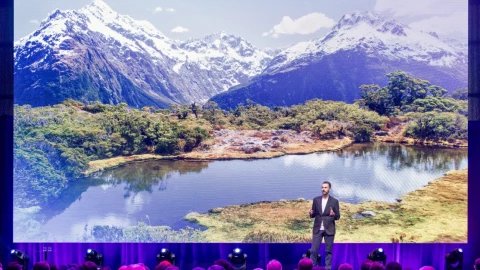Sustainable Operations
From our largest wind farm in rural America to new electric vehicles that will be hitting the roads soon, we are reducing Amazon’s carbon footprint across our global business operations and leading the way for other companies to decarbonise worldwide. By setting ambitious goals and making strategic partnerships and investments, we can reduce our impact for the benefit of our customers, our communities, and our planet.
Building a sustainable tomorrow today
We are compelled to take meaningful action today that deliver both immediate and future benefits to Australia and New Zealand, and their communities.
Our commitment to sustainability paves the way for business operations to have a positive impact on the environment in the service of building a better future for all.
We are building sustainability into all of Amazon’s operations, and using a science-backed approach to drive innovative solutions to scale. From ensuring that suppliers share our environmental goals to innovations in packaging that minimise waste, we are taking bold actions to stop the global climate crisis. Our commitment to The Climate Pledge means that we are focused—first and foremost—on decarbonising our operations and sending strong signals that we are in need of new solutions and technologies to help accelerate our path to net-zero carbon by 2040.
-
Amazon is investing in a range of large-scale solutions to decarbonise our business, some with immediate carbon savings and others with longer-term payoffs. Learn how we are eliminating carbon across our supply chain to reach net-zero carbon by 2040.
-
Transitioning to renewable energy is one of the most impactful ways to lower carbon emissions. As part of our commitment to reach net-zero carbon, we’re on a path to powering our operations with 100% renewable energy by 2025—five years ahead of our original target of 2030. To reach this target, we want 100% of the electricity that we use to be attributable to renewable energy sources.
-
We’re decarbonising transportation across our business by increasing fleet efficiency, expanding the use of low-carbon fuels, and scaling electric and alternative-fuel vehicles. We also partner on initiatives to reduce carbon emissions in the wider transportation industry, and engage with policymakers and other decision-makers to advance policies in support of decarbonisation.
-
We are transitioning our buildings to be net-zero carbon, powered by renewable energy, with a focus on water and waste reduction strategies across our facilities.










